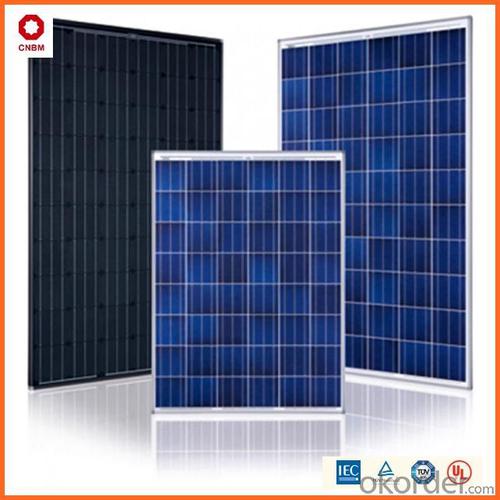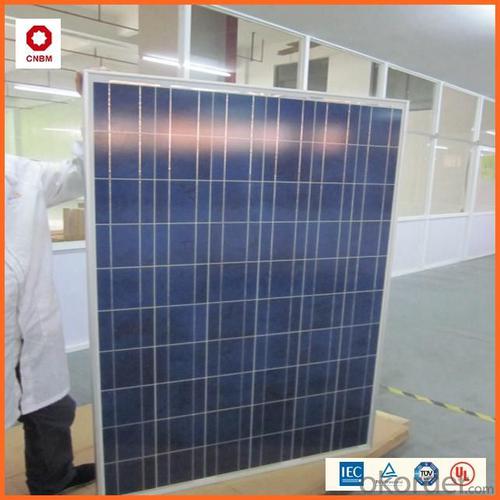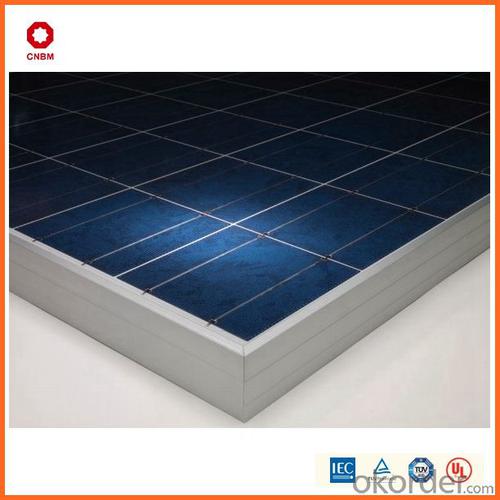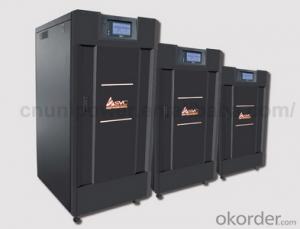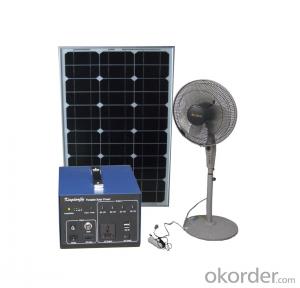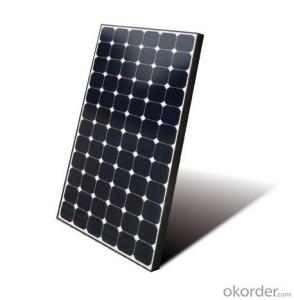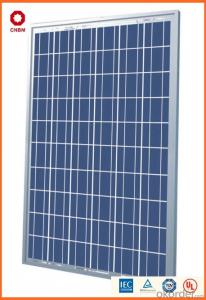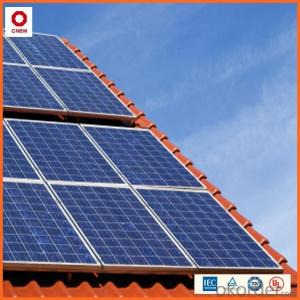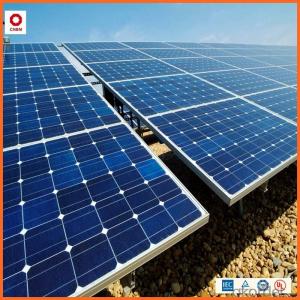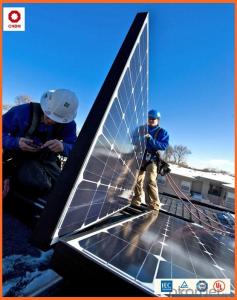El Sol Solar Energy Systems ☆☆☆Stock on Sale 260W Poly Solar Panel 0.45/W A Grade Good Solar Panel☆☆☆
- Loading Port:
- China main port
- Payment Terms:
- TT OR LC
- Min Order Qty:
- 1 watt
- Supply Capability:
- 10000000 watt/month
OKorder Service Pledge
OKorder Financial Service
You Might Also Like
Product Description:
Hot Sale !!! Quality and Safety of 245w-320w Poly Solar Panel
1. Rigorous quality control meets the highest international standards.
2. High-transmissivity low-iron tempered glass, strong aluminium frame.
3. Using UV-resistant silicon.
4. IS09001/14001/CE/TUV/UL
Warranties of 245w-320w Poly Solar Panel
1. 10 years limited product warranty
2. 15 years at 90% of the minimal rated power output
3. 25 years at 80% of the minimal rated power output
Technical date of 245w-320w Poly Solar Panel
ITEM NO.: | Mono 125*125 cell ,36pcs . Power range from 80Wp-100Wp | ||||||||
Maximum Power(W) | 80 | 85 | 90 | 95 | 100 | ||||
Optimum Power Voltage(Vmp) | 17.81 | 17.89 | 17.94 | 17.99 | 18.06 | ||||
Optimum Operatige Current(Imp) | 4.78 | 4.91 | 5.12 | 5.35 | 5.59 | ||||
Open Circuit Voltage(Voc) | 21.98 | 22.05 | 22.14 | 22.28 | 22.45 | ||||
Short Circuit Current(Isc) | 4.95 | 5.15 | 5.36 | 5.65 | 5.84 | ||||
Solar Cell: | 125*125 Mono | ||||||||
Number of Cell(pcs) | 4*9 | ||||||||
Brand Name of Solar Cells | JA Cell, Bluesun Cell | ||||||||
Size of Module(mm) | 1580*808*35 | ||||||||
Caple & Connector Type | Pass the TUV Certificate | ||||||||
Frame(Material Corners,etc.) | Aluminium-alloy | ||||||||
Backing (Brand Type) | TPT | ||||||||
Cell Efficiency for 100W(%) | 15.8% | ||||||||
Weight Per Piece(KG) | 12.0KG | ||||||||
FF (%) | 70-76% | ||||||||
Junction Box Type | Pass the TUV Certificate | ||||||||
Tolerance Wattage(e.g.+/-5%) | ±3%, or 0-3% | ||||||||
Front Glass Thikness(mm) | 3.2 | ||||||||
Temperature Coefficients of Isc(%) | +0.04 | ||||||||
Temperature Coefficients of Voc(%) | -0.38 | ||||||||
Temperature Coefficients of Pm(%) | -0.47 | ||||||||
Temperature Coefficients of Im(%) | +0.04 | ||||||||
Temperature Coefficients of Vm(%) | -0.38 | ||||||||
Temperature Range | -40°C to +85°C | ||||||||
Surface Maximum Load Capacity | 2400Pa | ||||||||
Allowable Hail Load | 23m/s ,7.53g | ||||||||
Bypass Diode Rating(A) | 12 | ||||||||
Warranty | 90% of 10 years,80% of 25 years. | ||||||||
Standard Test Conditions | AM1.5 1000W/ 25 +/-2°C | ||||||||
Packing | carton or pallet | ||||||||
1*20' | 25 Pallets / 450pcs | ||||||||
1*40'STD | 25 Pallets / 100pcs | ||||||||
Features of our products:
• High conversion efficiency mono/poly-crystalline amorphous silicon solar cells
• Modules incorporate high performance bypass diodes to minimize the power drop caused by shading
• High transmittance, low-iron tempered glass
• High performance EVA encapsulant to prevent destroying and water.
• AI frame: without screw, corner connection. 8 holes on the frame can be installed easily
• Good performance of preventing from atrocious weather such as wind and hails
• Certifications: CE IEC TUV VDE UL, Class I
• 10 years 90% power output warranty

Shipping of 245w-320w Poly Solar Panel
By Sea | Delivery from Shanghai or Ningbo seaport |
By Air | Departure from Shanghai Pudong Airport |
By Express | Post by DHL, EMS, UPS, TNT. |
- Q: How do solar energy systems impact the energy efficiency of a home?
- The energy efficiency of a home is significantly impacted by solar energy systems. These systems utilize the sun's power to generate electricity, which can then be used to operate various appliances and devices within the household. This reduces the need for traditional energy sources like fossil fuels and helps to decrease greenhouse gas emissions. One major benefit of solar energy systems is that they offer a clean and renewable source of power. Homeowners can generate their own electricity by harnessing the abundant sunlight, reducing their dependence on the grid. This not only conserves natural resources but also decreases the overall carbon footprint of the home. Another way in which solar energy systems improve energy efficiency is through net metering. This system allows homeowners to sell any excess electricity generated by their solar panels back to the grid, offsetting their energy consumption during periods when the sun is not shining. This ensures that the energy produced by the solar panels is used efficiently and not wasted. Additionally, solar energy systems often come equipped with advanced monitoring and control features. These features enable homeowners to track their energy usage in real-time, identifying areas of high consumption and taking steps to optimize energy usage. By making informed decisions based on this data, homeowners can further enhance the energy efficiency of their homes. Furthermore, solar energy systems increase the value of a home. Studies have shown that homes equipped with solar panels tend to sell at higher prices compared to those without. This is because potential buyers are attracted to the idea of reduced energy costs and an environmentally friendly lifestyle. Overall, solar energy systems play a crucial role in improving the energy efficiency of homes. By utilizing the power of the sun, homeowners can reduce their reliance on traditional energy sources, decrease their carbon footprint, and save money on electricity bills. With advancements in solar technology, these systems are becoming increasingly efficient and affordable, making them a viable option for homeowners seeking to enhance the energy efficiency of their homes.
- Q: Are solar energy systems suitable for agricultural applications?
- Yes, solar energy systems are highly suitable for agricultural applications. They provide a reliable and sustainable source of power for various farming operations, such as irrigation, crop drying, and livestock management. Solar energy systems are cost-effective, environmentally friendly, and can be easily integrated into existing agricultural infrastructure. They also help reduce dependency on fossil fuels, lower energy costs, and contribute to overall sustainability in the agricultural sector.
- Q: Can solar energy systems be used in powering music studios or recording studios?
- Yes, solar energy systems can definitely be used to power music studios or recording studios. Solar power systems are a clean and renewable energy source that can provide a reliable and cost-effective solution for powering various electrical equipment, including the high energy-consuming equipment found in music studios. Solar panels can be installed on the roof or any other suitable area of the studio building to harness sunlight and convert it into electricity. This electricity can then be used to power a wide range of equipment such as amplifiers, mixers, microphones, computers, lighting, and air conditioning systems. The size of the solar power system required will depend on the energy needs of the studio. By analyzing the energy consumption patterns and demands of the studio, solar energy experts can design and install a customized solar power system to meet the specific requirements of the studio. One of the advantages of using solar energy in music studios is the potential for significant cost savings. Traditional electricity sources, especially in commercial settings, can be quite expensive. By generating their own electricity through solar power, studios can reduce their reliance on the grid and potentially lower their electricity bills. Additionally, solar energy is a sustainable and environmentally friendly option. Music studios often consume a large amount of electricity, and using solar power can help reduce their carbon footprint and contribute to a greener future. It is worth noting that solar energy systems can also be combined with battery storage systems. This allows music studios to store excess energy produced during the day and use it during times of low solar generation or at night. This further enhances the reliability and independence of the solar power system. In conclusion, solar energy systems can be effectively used to power music studios or recording studios. They offer a clean, renewable, and cost-effective solution that can meet the energy demands of these facilities while reducing their environmental impact.
- Q: What is the impact of saltwater exposure on solar panels?
- Saltwater exposure can have a detrimental impact on solar panels. The salt in seawater can corrode the panels' metal components, such as the frames and connectors, leading to reduced efficiency and potential damage. It can also cause the glass surface to become hazy, which restricts sunlight penetration and lowers energy production. Proper maintenance, such as regular cleaning and protective coatings, is necessary to mitigate the negative effects of saltwater exposure on solar panels.
- Q: Can solar energy systems be used for outdoor recreational activities?
- Yes, solar energy systems can certainly be used for outdoor recreational activities. Solar panels can be installed on RVs, boats, and camping equipment to provide a sustainable and renewable power source for lighting, charging devices, running small appliances, and more. Additionally, solar-powered outdoor lights and solar-powered phone chargers are commonly used in camping, hiking, and other outdoor activities.
- Q: How can solar energy systems reduce electricity bills?
- Generating free and renewable energy from the sun, solar energy systems have the potential to significantly decrease electricity bills. Unlike conventional electricity sources like fossil fuels, solar energy doesn't necessitate ongoing expenses for fuel or maintenance. Once installed, a solar energy system can produce electricity for many years, offsetting a substantial portion of a household's or business's electricity usage. By utilizing the power of the sun, solar energy systems can generate electricity when it is most in demand during daylight hours. Consequently, solar energy can directly compensate for electricity consumption during peak times, diminishing the need to draw power from the grid. Consequently, electricity bills can be drastically reduced or even eliminated, depending on the size and efficiency of the solar energy system. Furthermore, solar energy systems often provide homeowners and businesses with the opportunity to take advantage of numerous financial incentives and programs. These incentives may include tax credits, grants, or policies such as net metering, which allows surplus solar energy to be fed back into the grid and credited towards future electricity bills. These incentives can augment the financial advantages of installing solar energy systems, making them even more cost-effective. Additionally, solar energy systems offer long-term savings. As the cost of electricity from conventional sources continues to escalate, solar energy remains a steadfast and predictable investment. By securing a fixed cost for electricity generation, solar energy systems safeguard against future price hikes and inflation, ensuring that electricity bills remain low and foreseeable for years to come. Overall, solar energy systems provide a sustainable and economically viable solution for reducing electricity bills. By tapping into the abundant and free energy of the sun, households and businesses can enjoy substantial savings, financial incentives, and long-term stability in their energy costs.
- Q: Can solar energy systems be used in powering swimming pools or spas?
- Certainly, swimming pools or spas can be powered by solar energy systems. Solar pool heating systems harness the sun's energy to warm the water in the pool or spa, presenting a more sustainable and economical option compared to traditional heating methods. Typically, these systems comprise solar collectors, a pump, and a filter. The solar collectors, typically positioned on the roof or ground, absorb sunlight and transfer its warmth to the pool water. The pump circulates the water through the collectors and returns it to the pool, ensuring a continuous flow of heated water. By utilizing a renewable energy source, solar energy systems for swimming pools and spas not only lower energy expenses but also contribute positively to the environment.
- Q: Can solar energy systems be used in powering research farms or agricultural laboratories?
- Yes, solar energy systems can certainly be used to power research farms or agricultural laboratories. Solar panels can generate electricity which can be used to power various equipment and machinery used in these facilities, such as irrigation systems, lighting, climate control systems, and other electrical devices. By utilizing solar energy, these agricultural facilities can reduce their reliance on fossil fuels and significantly lower their operational costs while also contributing to a more sustainable and environmentally friendly approach to farming and research.
- Q: How do solar energy systems impact the electricity generation mix?
- Solar energy systems have a significant impact on the electricity generation mix as they contribute to the diversification of the energy sources. By harnessing the power of the sun, solar systems reduce the reliance on fossil fuels, leading to a decrease in greenhouse gas emissions and a transition towards cleaner and more sustainable electricity generation. Solar energy systems also enable decentralized power generation, allowing for increased energy independence, grid stability, and resilience. Overall, the integration of solar energy systems into the electricity generation mix promotes a more balanced and environmentally friendly energy portfolio.
- Q: How does a solar energy system convert sunlight into electricity?
- A solar energy system converts sunlight into electricity through a process called the photovoltaic effect. This effect occurs in solar panels, which are made up of multiple silicon cells. When sunlight hits the solar panels, it is absorbed by the silicon cells, which are semiconductors. The energy from the sunlight excites the electrons in the silicon atoms, causing them to break free from their atomic bonds and create an electric current. This current is in the form of direct current (DC), which is not suitable for most household appliances. Therefore, an inverter is used to convert the DC electricity into alternating current (AC), which is the standard type of electricity used in homes and businesses. The AC electricity produced by the solar energy system can then be used to power various appliances and devices in a building. If the system produces more electricity than is being used, the excess can be stored in batteries for later use or fed back into the grid through a process called net metering. In summary, solar energy systems convert sunlight into electricity by using solar panels to absorb the sunlight and generate an electric current through the photovoltaic effect. This current is then converted from DC to AC and can be used to power buildings or stored for later use.
Send your message to us
El Sol Solar Energy Systems ☆☆☆Stock on Sale 260W Poly Solar Panel 0.45/W A Grade Good Solar Panel☆☆☆
- Loading Port:
- China main port
- Payment Terms:
- TT OR LC
- Min Order Qty:
- 1 watt
- Supply Capability:
- 10000000 watt/month
OKorder Service Pledge
OKorder Financial Service
Similar products
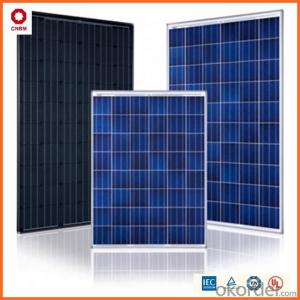
Solar Energy Systems Spain ☆☆☆stock on sale 255w poly solar panel 0.45/w!!!!☆☆☆ a grade good quality
Hot products
Hot Searches
Related keywords




